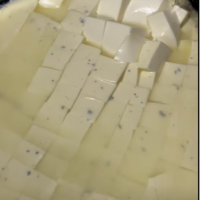Yes, you can leave Parmesan cheese out, but not for too long. As a hard cheese, it’s more resilient than softer varieties.
Generally, you should not leave Parmesan cheese unrefrigerated for more than 2 to 4 hours to ensure its freshness and quality, though some sources say up to 6 hours is acceptable.
Imagine, you’ve just sprinkled a delicious snowstorm of Parmesan cheese all over your favorite pasta. Yum! But now you’re looking at the cheese and wondering, “Does this need to go back in the fridge right away, or can it hang out on the counter for a bit?”
Parmesan is that awesome hard cheese you probably love to grate over spaghetti, sprinkle on pizzas, or even just sneak a bite of. It’s a kitchen superstar.
So, the big question we’re (let’s rephrase this to keep it consistently ‘you’ focused, or more general to include the reader in the discovery) going to dig into, and one you’ve likely wondered about, is whether Parmesan cheese can be left out, and if so, for how long is it okay?
It turns out, the answer isn’t a super simple yes or no for you. Things like whether your Parmesan is a solid block or already grated, and even how warm your kitchen is, can make a difference.
You’ll want to know all of this so you can keep your yummy Parmesan safe and tasting its best.
Can You Leave Parmesan Cheese Out?
Yes, Parmesan cheese can be left out of the refrigerator for a certain period, but there are important factors to consider regarding safety and quality.
Parmesan is a hard cheese with a low moisture content, which makes it more resistant to bacterial growth compared to softer cheeses.
Here’s a breakdown of what you need to know:
How Long Can Parmesan Be Left Out?
General Food Safety Guidelines
The U.S. Department of Health and Human Services generally advises that perishable foods, including cheese, should not be left at room temperature for more than two hours.
This time limit is reduced to one hour if the ambient temperature is above 90°F (32°C).
Hard Cheeses Like Parmesan
Due to its low moisture content, Parmesan is more forgiving. Many sources indicate that a block of Parmesan cheese can be left out for longer periods, potentially up to 4 to 8 hours, without becoming unsafe.
Some anecdotal accounts even suggest longer times, especially in cooler temperatures. However, for optimal quality and to minimize any risk, shorter durations are preferable.
Form of Parmesan Matters
- Block Parmesan: A solid block of Parmesan will last longer at room temperature than grated or shredded forms because less surface area is exposed to air and potential contaminants.
- Grated or Shredded Parmesan: These forms are more perishable and should be returned to the refrigerator more promptly, ideally within the general two-hour guideline, to maintain their best quality and safety.
- Quality vs. Safety: While Parmesan might remain safe to eat even after several hours at room temperature, its quality (flavor and texture) can degrade. It may dry out or develop off-flavors if left out for too long.
Why Can Parmesan Be Left Out Longer Than Other Cheeses?
Parmesan’s relatively long shelf life at room temperature is due to its production process and composition:
Low Moisture Content
Parmesan cheese has a significantly lower moisture content (around 32%) than soft cheeses. This makes it a less hospitable environment for bacteria to thrive.
Aging Process
It is aged for an extended period (often 10 months or more), which further reduces moisture and develops its characteristic hard, granular texture.
The Parmesan Predicament: Your Guide to Storing and Serving This Beloved Cheese
Okay, picture this: you’ve just sprinkled a delicious snowstorm of Parmesan cheese all over your favorite pasta.
Yum! But now you’re looking at the cheese and wondering, “Does this need to go back in the fridge right away, or can it hang out on the counter for a bit?”
Parmesan is that awesome hard cheese you probably love to grate over spaghetti, sprinkle on pizzas, or even just sneak a bite of. It’s a kitchen superstar.
So, the big question we’re going to dig into, and one you’ve likely wondered about, is whether Parmesan cheese can be left out, and if so, for how long is it okay?
It turns out, the answer isn’t a super simple yes or no for you. Things like whether your Parmesan is a solid block or already grated, and even how warm your kitchen is, can make a difference.
You’ll want to know all of this so you can keep your yummy Parmesan safe and tasting its best!
The Big Question: How Long Can Parmesan Cheese Safely Sit Out?
So, you want to know how long can Parmesan sit out? Let’s get into it.
Generally, Parmesan cheese can sit at room temperature for about 4 hours, and still be safe to eat and good quality. Some folks might even say up to 8 hours, especially for a big block, but sticking to 4 hours is a safer bet to make sure it still tastes great and stays safe.
This is longer than the standard 2-hour rule for many other foods precisely because its hard, dry nature makes it more resilient.
Think of it as a “low-moisture, less-worry” kind of cheese when it comes to hard cheese unrefrigerated for a short while.
What are the Factors Influencing the Time Limit?
While 4 hours is a good general rule for Parmesan room temperature exposure, a few things can change that:
Type of Parmesan
Block/Wedge Parmesan: If you have a solid wedge of Parmesan, it’s going to be more resilient. There’s less surface area exposed to air and potential moisture, so it holds up better when left out.
Grated/Shredded Parmesan: This is a different story. Once Parmesan is grated or shredded, it has way more surface area. This means it can pick up moisture from the air more easily and is more likely to spoil faster.
If you’re wondering about grated Parmesan out of fridge, it’s best to be more cautious. For example, Kraft, a major producer of grated Parmesan, actually recommends putting its grated Parmesan back in the fridge within about an hour of being at room temperature.
So, if it’s grated, the time it can be safely left out is much shorter.
True Parmigiano Reggiano vs. Domestic Parmesan
Authentic Parmigiano Reggiano from Italy has specific aging requirements (a minimum of 12 months) and production methods that contribute to its hardiness.
Domestic Parmesan cheeses, while still delicious, might have different aging periods or slightly more moisture.
However, for general advice on leaving it at room temperature, the 4-hour guideline is a good starting point for both, with grated versions always needing more care.
Room Temperature & Environment
The “danger zone” for bacterial growth in food is between 40°F (4°C) and 140°F (60°C). If your room is on the cooler side, your Parmesan will fare better.
However, if it’s a hot day and your kitchen is toasty – say, above 90°F (32°C) – you’ll need to shorten that time considerably.
In such heat, food safety guidelines often recommend no more than 1 hour for perishable foods, and it’s wise to apply this caution to your Parmesan too.
High humidity can also play a role. More moisture in the air means more chance for the cheese (especially grated) to absorb it, which isn’t great for keeping it fresh and could encourage spoilage.
Understanding these factors helps ensure your Parmesan safety and keeps it tasting great.
What Happens if Parmesan is Left Out Too Long?
Leaving Parmesan cheese out for an extended period can lead to a few undesirable outcomes, affecting both its quality and safety.
Quality Degradation
Even if it doesn’t become unsafe, the delightful qualities of your Parmesan can suffer if it sits out too long:
Changes in taste and flavor: The rich, nutty flavor you love can start to taste a bit off or become less vibrant.
Drying out, changes in texture: Especially with wedges, the cheese can dry out, becoming harder than you want and potentially developing cracks. Grated Parmesan might clump or become tough.
Absorption of other odors: Cheese, particularly its fatty parts, is notorious for absorbing smells from its surroundings. If left uncovered, your Parmesan might start tasting like last night’s onions or other strong kitchen aromas.
Risk of Spoilage & Bacterial Growth
While Parmesan is a hard cheese with low moisture content, making it less prone to spoilage than soft cheeses, the risk isn’t zero, especially if left out for many hours or in warm conditions.
Visible signs of spoiled Parmesan
Mold: This is a key indicator. On a hard block of Parmesan, a small spot of mold can often be cut off (make sure to cut away at least an inch around and below the moldy spot, and don’t let the knife touch the mold).
However, if you see mold on Parmesan that is grated or shredded, it’s best to discard the entire container. Mold can spread more easily throughout grated cheese, and some molds produce toxins you can’t see.
- Discoloration: If the cheese changes color in an unappetizing way.
- Slimy texture: This is a definite warning sign.
- Off-putting smell: If your Parmesan develops an ammonia-like smell or any other bad odor, it’s a sign it has Parmesan gone bad. Trust your nose!
The “Overnight” Dilemma:
A common question is: “Can I leave Parmesan left out overnight?”
Even though you might hear anecdotal stories of leaving hard cheese out overnight without issues, food safety experts generally don’t recommend you do this. This is to maintain optimal quality and minimize any potential risk.
The longer it’s out, especially at room temperature (which can fluctuate overnight), the more opportunity there is for quality to decline and for any potential bacteria to multiply.
Even if a block of Parmesan seems okay after being left out overnight, its flavor and texture might be compromised. For grated Parmesan, leaving it out overnight is a definite no-go due to its higher susceptibility to spoilage.
When it comes to food, it’s always better to err on the side of caution.
How to Properly Store the Parmesan cheese?
To keep your Parmesan cheese tasting its best and lasting as long as possible, proper storage is crucial. Here’s what you need to know:
Refrigeration is Key for Longevity & Quality
For most types of Parmesan, especially once the original packaging is opened or if it’s freshly cut, the refrigerator is its best friend.
While it can handle room temperature for short periods, consistent refrigeration helps maintain its flavor, texture, and overall quality for much longer.
The ideal refrigerator temperature for cheese is generally between 35°F and 45°F (approximately 1.6°C to 7.2°C).
Proper Wrapping Techniques
How you wrap Parmesan cheese before putting it in the fridge makes a big difference. The goal is to let the cheese “breathe” a bit to prevent moisture buildup (which can lead to mold) while also protecting it from drying out and absorbing other fridge odors.
For a block or wedge
First, wrap the Parmesan in parchment paper, wax paper, or special cheesecloth/cheese paper. This allows the cheese to breathe.
Then, you can place the paper-wrapped cheese into a loosely sealed plastic bag or an airtight container.
Some cheese experts advise against wrapping cheese tightly in plastic wrap for long periods if it’s in direct contact, as it can trap too much moisture and sometimes impart a plastic-like flavor.
If you use an airtight container, make sure it’s not too small, allowing some air circulation if possible, or open it periodically if storing for a very long time.
For grated Parmesan
Store it in an airtight container. This is the best way to keep it from drying out and absorbing unwanted flavors.
These methods help in preventing drying out and odor absorption, keeping your cheese fresh.
Shelf Life in the Refrigerator
The Parmesan shelf life in the fridge varies:
- Unopened block (vacuum-sealed): This can last for a surprisingly long time, often several months – some sources say even 7 to 9 months if the seal is intact and it’s stored properly. Always check the “best by” date on the packaging.
- Opened block/wedge: Once opened, a block of Parmesan will typically last for several weeks to a couple of months. Common estimates range from 3-4 weeks to as long as 1-2 months if stored correctly.
- Grated Parmesan (freshly grated by you or store-bought refrigerated): This has a shorter shelf life. Once opened (or after you grate it), aim to use it within about a week for the best quality.
Can You Freeze Parmesan Cheese?
Yes, freezing Parmesan is an option, especially if you’ve bought a large quantity and won’t use it all within its refrigerated shelf life.
Freezing can alter the texture of Parmesan slightly, making it more crumbly once thawed.
Because of this, frozen and thawed Parmesan is generally best used for grating into cooked dishes (like sauces, soups, or casseroles) rather than for shaving over a finished dish where texture is more noticeable.
Conclusion
So, navigating the world of Parmesan cheese storage doesn’t have to be a predicament! Let’s quickly recap the main points to keep your cheese experience top-notch.
Parmesan, as a hard cheese, can generally sit out at room temperature for about 4 hours, but this can be less if it’s grated or if your kitchen is very warm.
Proper storage is vital: refrigeration is your best bet for long-term quality, wrapped first in parchment or wax paper, then loosely in plastic or an airtight container.
Always be on the lookout for signs of spoilage like mold (especially on grated cheese, which should be discarded if moldy), off-smells, or a slimy texture. When in doubt, throw it out!
Conclusion: Better Safe (and Delicious) Than Sorry
So, when it comes to your Parmesan cheese, a little know-how goes a long way!
Remember that general 4-hour guideline for how long a block of Parmesan can sit out at room temperature (and less for grated!).
Proper storage, especially refrigeration and correct wrapping, is super important for keeping it tasting great and lasting longer.
Always keep an eye out for those signs of spoilage like mold or weird smells – when in doubt, it’s best to throw it out.














